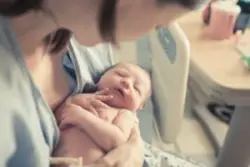
Excessive drooling is a sign of a stroke in babies who should have developed the ability to hold their mouth closed and swallow. However, there are often more likely explanations for your child’s drooling.
For example, babies drool when they are teething. It may not indicate anything unusual in this case, but it could also suggest problems with muscle control or a neurological issue.
Pediatric stroke affects 25 in 100,000 newborns and 12 in 100,000 children under 18 years of age. This is according to Children’s Hospital of Philadelphia, which has one of the nation’s leading pediatric stroke programs.
Other Signs of Pediatric Stroke
While excessive drooling is a sign of a stroke in infants and toddlers, it is not one of the most common signs. These may include:
- Seizures, sometimes within the first day of life.
- Extreme sleepiness and lethargy.
- Only using one side of the body, or not moving both sides in a coordinated or symmetrical way.
- Marked weakness on one side.
- Eating problems.
- Apnea.
- Very early hand preference.
- Difficulty with motor-related developmental milestones.
Outside of seizures that occur very early, the signs of a stroke may not be obvious until the child is several months old. Signs of a previous stroke may continue to be overlooked in babies and toddlers, and some children even receive incorrect diagnoses before doctors are able to identify the true cause.
"If your child was born with a birth injury, or cerebral palsy, we can help."
Excessive Drooling May Indicate Another Concern
In general, parents may notice an increase in their child’s drooling at two points during infancy, including when the child’s salivary glands begin to function normally—around two and three months—and when the baby is teething. Drooling is one of the top indicators that your baby will cut a tooth soon, so if they begin drooling excessively around the time a tooth is due, this is likely the cause.
However, excessive drooling in older infants and toddlers without cause may indicate another underlying condition. This can include the following conditions.
Autism Spectrum Disorders (ASD)
In older babies, toddlers, and pre-school aged children, excessive drooling may indicate an ASD. A number of factors work together to cause children with autism to drool excessively, including poor muscle control and sensory concerns.
Bell’s Palsy
Bell’s palsy is a nerve injury that causes babies to be unable to control one side of the face. This leads to a droopy eye and mouth on that side. The baby may drool from the affected side of the mouth, have dry eye on that side, and experience other symptoms as a result of the paralyzed facial muscles.
Cerebral Palsy
Cerebral palsy is a neurological disorder that develops after an injury to a certain area of the brain. Cerebral palsy affects muscle control significantly, and this may include muscle control of the mouth and throat. Roughly 40 percent of children diagnosed with cerebral palsy also have a diagnosis of sialorrhea, or hypersalivation, according to the American Academy for Cerebral Palsy and Developmental Medicine.
Other Neurological Concerns
Other neurological conditions and injuries can also cause excessive drooling. When the brain is not able to send signals to the affected muscles, it can cause paralysis in the area. When these muscles lack strength, ability, or coordination, it can be difficult for the child to close their mouth and swallow excess saliva.
Excessive Saliva and Birth Injury Claims
Many of the underlying conditions that can cause excess drooling in an infant or toddler may lead back to a birth injury. If there is evidence that this birth injury occurred because of medical negligence, you may have a viable claim against the doctor who handled your pregnancy and labor, or the facility where your child was born.
You may want to speak with a birth injury attorney in your state for a complimentary review of your case. A lawyer may be able to help you hold the liable parties accountable and recover compensation for your family.
"We know first-hand what you are going through."
Speak to a Member of Our Team to Get Help Today
At the Birth Injury Lawyers Group, a member of our team will evaluate your claim and help you understand your options during a free consultation. We know how medical malpractice laws can apply to cases like these and can help you get started if we believe you qualify to take legal action.
Dial (800) 222-9529 now to discuss your child’s birth, symptoms, diagnosis, and more with a member of our team.
"We are committed to helping families who have suffered medical negligence."

